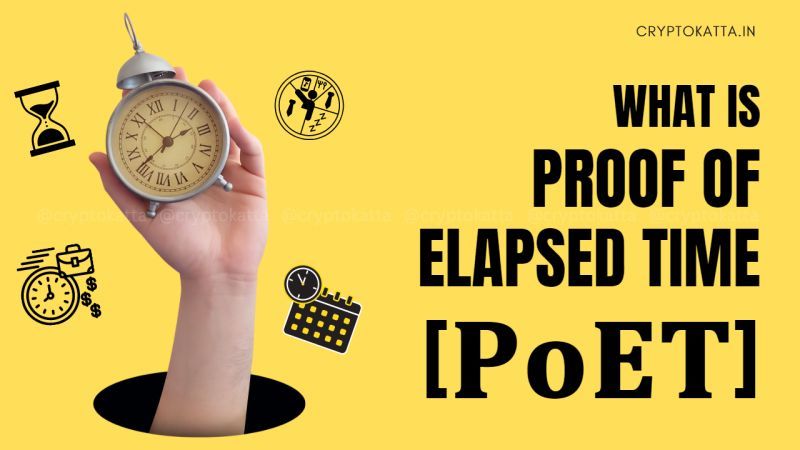Proof of Elapsed Time in Crypto: Unlocking Efficiency in Blockchain Security
Ready to dive into a world where time unlocks efficiency and security for blockchain tech? The key? Proof of elapsed time in crypto. It stands out as a smart system that’s all about fair play in blockchain’s rush hours. It trusts your computer’s clock to queue up for a chance to add new blocks. Simple but genius, right? Ever heard of Intel Sawtooth? Well, it’s this playground where PoET shows its true colors. So, hang tight, as we break down this game-changer, from nuts and bolts to big-time perks and its green thumbprint on blockchain land.
Understanding the Essentials of PoET in Blockchain
The Fundamentals of the PoET Consensus Mechanism
The PoET consensus mechanism is like a fair game in blockchain. It decides who gets to add the next block. It uses time instead of hard math problems to do this. This means computers don’t need to do a lot of work and use lots of power, which is better for our earth.
With PoET, every computer in the network gets a random time to wait. It’s like picking a random number out of a hat. When a computer’s wait time is up, it gets a chance to add a new block. All the other computers can check to make sure it waited long enough. If all is good, the block gets added.
This way of picking turns is energy-efficient and gives everyone a fair shot. Big or small, every computer has the same chance of getting picked. And it’s all done without using a ton of electricity.
Implementing PoET with Intel Sawtooth Platform
Intel’s Sawtooth is a home for PoET, where it lives and works. It helps businesses use the PoET game without having to build it from scratch. It’s safe because it uses special hardware that protects our data. The Sawtooth platform makes sure the game is played right and is fair for everyone.
On Intel Sawtooth, smart contracts help people agree on things and do business without worry. They are like deals that can’t be broken because the computer keeps them safe. This means businesses can trust each other more and work together better.
In the Sawtooth world, PoET lets companies track stuff, make deals, and save money on computer costs. It’s all about being smart with resources and playing fair in this growing digital world. This way, as more people start using blockchain, the planet won’t have to pay the price for our progress.
The Technical Mechanics of PoET
Leader Election Process and Cryptographic Lottery System
In PoET, or Proof of Elapsed Time, every blockchain miner gets a fair shot. It’s like a game where everyone’s watch strikes a random time. When your time’s up, you can add a new block to the chain, if you follow the rules.
Intel’s Sawtooth platform uses this PoET magic. It means less energy spent, unlike the heavy-duty Proof of Work system. Think of PoET as a low-energy lottery where every miner has the same luck. This keeps our digital world running smooth and green.
Managing Random Wait Times for Fair Mining
The fair part of PoET is about random waits. Each miner in the network gets a random timer. This timer decides who gets to make the next block. It’s like a race where you don’t know when to run. You wait for the go signal.
Here’s where it gets cool. All timers are secret, but everyone plays it straight. No fibs allowed. This keeps it all even and clean. You can’t cheat or jump ahead in line. The blockchain stays secure and our planet thanks us for cutting down on power use. This is PoET doing its part for a better tomorrow.
Evaluating PoET Against Other Consensus Mechanisms
Advantages and Disadvantages When Compared to Proof of Work
Let’s talk about how PoET stands out from the crowd. This means showing how it’s different from the big guy, Proof of Work, that most folks know from Bitcoin. For starters, PoET is like the friendly neighbor who believes in fairness. It makes sure all the computers get a turn to add to the blockchain, making sure no one gets left out. Now that’s nice, right? And PoET does this without using tons of electricity, unlike Proof of Work, which can be a power hog!
But hold on; PoET isn’t perfect. It needs special hardware, and not everyone’s got that lying around. Plus, it’s not as tested as Proof of Work, which has been around the block a few times. Some folks worry it might not be as tough against cheaters. We keep an eye on this to make sure things stay secure and fair.
The Impact of PoET on Scaling Blockchain Technology and Energy Consumption
Now, scaling up means making something bigger without messing it up. With PoET, blockchain can grow while keeping things smooth and fast. That’s a big deal because bigger and faster usually mean more energy use. But not with PoET—it’s made to save energy. So, how does PoET keep things light on power? It does so by giving each computer a random time to wait before they can add to the blockchain. No race for power here!
Also, think about this: if we’re using less power, we’re being kind to our planet. That’s right, lower energy use means we’re helping reduce our carbon footprint. Who knew tech could be eco-friendly? With PoET, we’re proving it can be.
But here’s the snag: PoET might not fit every type of blockchain out there. For large public blockchains with lots of random users, it might not be the top choice yet. So your cool enterprise blockchain project? PoET could be great for that. Your global, anyone-can-join blockchain? It might need a different setup. We’ve got to match the right tools to the right job.
By looking at PoET like this, we can see it’s got some solid points. It’s fair, good with power use, and it could help blockchain tech grow. But like a new kid on the block, it’s got some things to learn too. It’s all about finding what works best for your blockchain adventure. With PoET, we’re nudging closer to a world where blockchains run smooth like a stream, without chugging down heaps of power. Now that’s a future I want to be a part of!
Strengthening Blockchain Security with PoET
The Role of Trusted Execution Environments in PoET
PoET, short for Proof of Elapsed Time, makes crypto both fair and green. It’s like a race where everyone must wait a random time before they can go. But no one can cheat. A trusted clock inside your computer, called a Trusted Execution Environment, or TEE, ensures this. It’s a safe space that keeps others from peeking at your clock.
In simple terms, PoET uses TEE to make sure no one fakes their wait time. Imagine kids playing musical chairs, but each has an alarm that tells them when to race to a chair. Their alarms are set differently, so each waits without knowing others’ times. That’s how PoET keeps its race to validate a block in the blockchain fair.
With the Intel Sawtooth platform, PoET taps into the TEE to verify the timing. So, your device becomes a trusty guard, ensuring that the timing is accurate. This way, when folks mine for coins, they can’t jump ahead. Everyone has a fair shake, and it uses less power than usual mining.
Ensuring Fairness and Security through Byzantine Fault Tolerance
When you chat with friends, you trust them, right? In the blockchain world, we have a thing called Byzantine Fault Tolerance, or BFT. This means that even if some computers are up to no good, the truth still comes out. BFT is like having a group project where if one kid doesn’t play fair, the group can still get an ‘A’.
PoET uses BFT for its own safety net. Even if some computers tell fibs, the honest ones can keep the blockchain true and tight. PoET makes sure no single player can mess things up. If one computer tries to cheat, the rest will spot it and keep things right.
So why does this matter? BFT keeps our digital money safe. If we want businesses to use blockchain, they need to trust it. BFT helps build this trust by making sure a few bad apples don’t spoil the bunch.
And here’s the cool part: for something that’s so secure, it doesn’t need much power. Unlike the heavy energy needs of Bitcoin’s mining, PoET is light on the bills. This means we can grow the blockchain without growing our carbon shoes. And this is big news for our planet.
In the world of blockchain, PoET sticks out as a secure and fair way to play the crypto game. But it’s not just about being fair; it’s also smart business. In scaling up for the big leagues of enterprise, energy crunching matters. With PoET, companies can step up their game in a way that’s good for their pocket and the planet.
Security in blockchain is like a lock on your front door. With PoET, that lock is tough and fair, and it doesn’t cost the earth to work. That’s the kind of lock everyone wants. And with that, the future of secure, green blockchain looks bright.
In this post, we’ve walked through the key parts of PoET in blockchain. We started by learning the basics and how it links with Intel Sawtooth. We then looked at how PoET picks leaders and manages wait times to be fair. Next, we compared PoET to other ways like Proof of Work, seeing how it helps blockchains grow and use less power. Finally, we explored how PoET makes blockchains safe with trusted setups and defenses against faults.
To wrap up, PoET stands out as a smart approach for blockchain networks. It’s fair, doesn’t need much energy, and is built to scale. By using trusted environments and fault tolerance, it keeps the system safe. PoET might just gear us up for a more efficient blockchain future. Keep an eye on it!
Q&A :
What is Proof of Elapsed Time (PoET) in cryptocurrency?
Proof of Elapsed Time (PoET) is a consensus mechanism used by some blockchain networks to ensure the fair creation of new blocks. It leverages a lottery system that chooses the winning participant based on a randomly selected wait time. Every participant in the blockchain network has an equal chance of being selected, as the wait times are generated by a secure, verifiable method ensuring that all nodes follow the protocol rules and that the selection process is unbiased.
How does PoET differ from other consensus mechanisms like Proof of Work?
Unlike Proof of Work (PoW), which requires computational power to solve complex mathematical puzzles, PoET is designed to be energy efficient. It doesn’t require massive amounts of electricity since it relies on time elapsation rather than computational power. While PoW involves competition among miners to complete transactions first, PoET assigns waiting times that play a significant role in determining the miner who gets to create the next block, resulting in minimal resource usage.
What are the advantages of using the PoET consensus mechanism?
The main advantages of PoET are energy efficiency and low barrier to entry. It greatly reduces the amount of electricity required to maintain the network compared to PoW, making it a more sustainable option. Additionally, it encourages more decentralization, as it allows individuals with less computational power to participate on an equal footing with those who have more resources. Furthermore, PoET can promote security and scalability within blockchain networks.
Can any cryptocurrency use Proof of Elapsed Time or is it specific to certain blockchains?
Proof of Elapsed Time was primarily developed for permissioned blockchain networks, such as those commonly used in enterprise applications, rather than decentralized, permissionless blockchains. That said, any cryptocurrency network that opts for a permissioned setting can implement PoET. The viability for non-permissioned networks remains a topic of research and development within the blockchain community.
What role does the underlying hardware play in ensuring PoET is secure?
The security of Proof of Elapsed Time largely depends on the presence of trusted execution environments (TEEs), like Intel’s Software Guard Extensions (SGX). These environments allow the code within to run in a secure area of the main processor, which is protected from the rest of the system’s processes. This ensures that the wait times can be generated and executed in a fair and secure manner, preventing malicious actors from exploiting the system.



